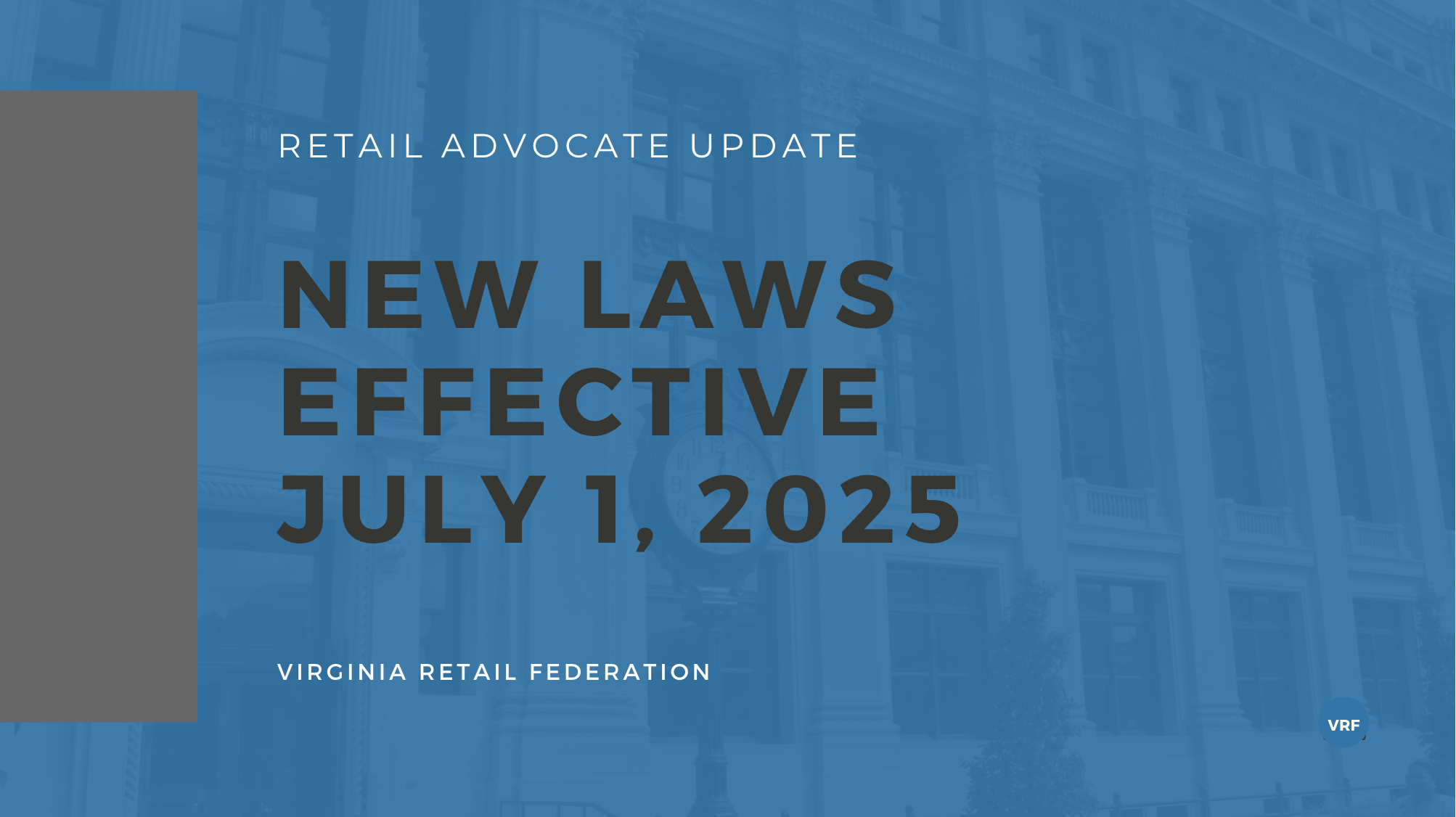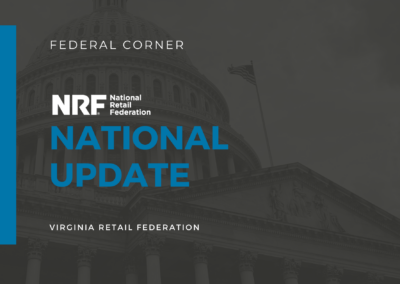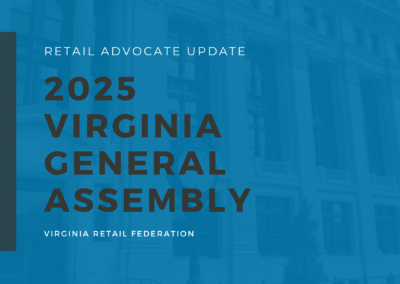After the conclusion of the regular legislative session, approximately 915 bills were communicated from the General Assembly to Governor Youngkin. Of that total, the Governor signed 599, vetoed 157, and sent back 159 bills to the General Assembly with recommended changes. The Two Capitols Consulting team tracked approximately 144 bills on behalf of the Virginia Retail Federation. Please see below for the list of bills, broken out by category, that have been signed by the Governor and will be enacted into law on July 1, 2025, unless otherwise noted. There are three bills and one budget item of significance, marked below for your awareness and review.
As a reminder, it is important to review all Code changes to make sure your company is in compliance with the new requirements outlined in this report. Please let us know if you have any questions.
ABC:
HB 1703 / SB 834 – Alcoholic beverage control; tied house exception – Effective Date July 1, 2025
- Removes certain provisions of the exceptions to the tied house limitations that state a manufacturer, bottler, importer, broker, or wholesaler cannot require, by agreement or otherwise, a retailer to exclude from sale at his establishment alcoholic beverages of other manufacturers, bottlers, importers, brokers, or wholesalers in order for the exception to apply. However, the bill retains the general prohibition that no manufacturer, bottler, importer, broker, or wholesaler of alcoholic beverages shall make an agreement, or attempt to make an agreement, with a retail licensee pursuant to which any products sold by a competitor are excluded in whole or in part from the premises on which the retail licensee’s business is conducted.
HB 2033 – Alcoholic beverage control retail licensees and employees; training on human trafficking – Effective Date July 1, 2025
- Directs the Department of Criminal Justice Services to develop an online course for the Virginia Alcoholic Beverage Control Authority to offer to retail licensees and their employees to train such licensees and employees to recognize and report instances of suspected human trafficking. The bill also requires the certified alcohol server or seller training that a retail licensee may offer its employees that allows a reduction in the length of any suspension or the amount of any civil penalty imposed for a license violation to include a course developed or approved by the Department of Criminal Justice Services on recognizing and reporting instances of suspected human trafficking.
HB 2058 / SB 811 – Alcoholic beverage control; delivery of mixed beverages; repeal – Delayed Effective Date July 1, 2026
- Clarifies that under current law, mixed beverage restaurant and limited mixed beverage restaurant licensees may sell for off-premises consumption or deliver up to two mixed beverages per meal served, but shall in no event sell for off-premises consumption or deliver more than four mixed beverages at any one time. The bill also provides clarification as to where delivery of such mixed beverages may be made. The bill maintains alcoholic beverage control third-party delivery licenses by eliminating the repeal of such licenses that is set to go into effect July 1, 2026.
SB 868 – Mixed bev. licensees; prohibition on delivery to consumer of original bottle of alcoholic beverage – Effective Date July 1, 2025
- Adds an exception to the prohibition on mixed beverage licensees or any agent or employee of such licensees delivering to a consumer an original bottle of an alcoholic beverage purchased under such license by allowing the delivery of the entire contents of an original container of spirits for on-premises or off-premises consumption provided that the (i) container is 16 ounces or less and (ii) alcohol content is no greater than 15 percent by volume.
AI:
HB 1642 – Artificial intelligence-based tool; definition, use of tool – Effective Date July 1, 2025
- Requires that the recommendations or predictions provided by any artificial intelligence-based tool, as such term is defined in the bill, shall not be the sole basis for any decision related to pre-trial detention or release, prosecution, adjudication, sentencing, probation, parole, correctional supervision, or rehabilitation of criminal offenders, provided that any such decision is made by the judicial officer or other person charged with making such decision. The bill provides that the use of any artificial intelligence-based tool shall be subject to any challenge or objection as permitted by law.
HB 2124 / SB 1053 – Synthetic digital content; penalty; work group – Effective Date July 1, 2025
- Expands the applicability of provisions related to defamation, slander, and libel to include synthetic digital content, defined in the bill. The bill makes it a Class 1 misdemeanor for any person to use any synthetic digital content for the purpose of committing any criminal offense involving fraud, constituting a separate and distinct offense with punishment separate and apart from any punishment received for the commission of the primary criminal offense. The bill also authorizes the individual depicted in the synthetic digital content to bring a civil action against the person who violates such prohibition to recover actual damages, reasonable attorney fees, and such other relief as the court determines to be appropriate. The bill directs the Attorney General to convene a work group to study and make recommendations on the current enforcement of laws related to the use of synthetic digital content, including deepfakes, and any further action needed to address the issue of such use in fraudulent acts. The substantive provisions of the bill do not become effective unless reenacted by the 2026 Session of the General Assembly and the provisions directing the Attorney General to convene a work group become effective in due course.
- The substantive provisions of the bill do not become effective unless reenacted by the 2026 Session of the General Assembly and the provisions directing the Attorney General to convene a work group become effective in due course.
Consumer Protection / Privacy:
SB 754 – Consumer Protection Act; prohibited practices, etc., reproductive or sexual health information – Effective Date July 1, 2025
- Provides that obtaining, disclosing, selling, or disseminating personally identifiable reproductive or sexual health information, as defined in the bill, without the consent of the consumer is a prohibited practice under the Virginia Consumer Protection Act.
- We met with members of OAG staff regarding SB754 to request any guidance they may be able to provide to companies to ensure compliance ahead of the new law change. They shared that they will not be providing any formal guidance going forward. Since each individual company has a different process for obtaining consent, the OAG recommended each company conduct a thorough review of their processes to make sure they are in compliance with the new law.
SB 854 – Consumer Data Protection Act; social media platforms; responsibilities and prohibitions related to minors – Delayed Effective Date July 1, 2026
- Requires that any controller or processor that operates a social media platform shall (i) use commercially reasonable methods, such as a neutral age screen mechanism, to determine whether a user is a minor younger than 16 years of age and (ii) limit any such minor’s use of such social media platform to one hour per day, per service or application, and allow a parent to give verifiable parental consent to increase or decrease the daily time limit.
SB 1376 – Virginia Consumer Protection Act; food labeling – Effective Date July 1, 2025
- Prohibits the sale of any food required by the U.S. Food and Drug Administration to have a nutrition label when such food is not labeled in accordance with federal law.
HB 1844 – Baby Food Protection Act; testing and labeling requirements for toxic heavy metals
- Prohibits a person from selling, distributing, or offering for sale a baby food product that contains certain toxic heavy metals that exceed the limits established by the U.S. Food and Drug Administration (FDA). The bill requires a manufacturer of a baby food product to meet certain testing requirements and include certain information related to toxic heavy metals on the manufacturer’s website and on the baby food product. The bill requires a consumer to report a baby food product to the Commissioner of Agriculture and Consumer Services if the consumer reasonably believes that the baby food is being sold in the Commonwealth with toxic heavy metals that exceed the limits established by the FDA. The foregoing provisions of the bill have a delayed effective date of January 1, 2026.
- The bill also directs the Department of Agriculture and Consumer Services to convene a work group to study and make recommendations on the current enforcement of laws related to the presence of toxic heavy metals in baby food products and any further action needed to address the issue of toxic heavy metals in baby food products. The bill requires the work group to report on its findings and recommendations by the first day of the 2026 Regular Session.
Employer Liability / Compensation:
HB 1730 / SB 894 – Personal injury or death by wrongful act; liability of employer to vulnerable victims – Effective Date July 1, 2025
- Provides that in an action for personal injury or death by wrongful act brought by a vulnerable victim, defined in the bill, against an employee, a finding that the employee’s employer is vicariously liable for such employee’s conduct shall be based on several factors, including the likelihood of the employee coming into contact with such vulnerable victim and the employer’s failure to exercise reasonable care over the employee.
HB 1766 / SB 1056 – Unemployment compensation; increases weekly benefit amounts, report – Effective Date July 1, 2025
- Provides that, for unemployment compensation claims effective on or after January 1, 2026, an eligible individual’s weekly benefit amount shall be $52 higher than the current weekly benefit amount, as denoted in the table in the printed bill. The bill directs the Commission on Unemployment Compensation, in consultation with the Virginia Employment Commission, to convene a work group to study making annual adjustments to individual weekly benefit amounts based on the average weekly wage.
Environment:
HB 1941 / SB 1166 – Invasive plant species; retail sales, penalty, delayed effective date January 1, 2027 – Delayed Effective Date January 1, 2027
- Requires, for the retail sale of certain invasive plant species for outdoor use, a retail establishment to post in a conspicuous manner on the property located in proximity to each invasive plant signage identifying such plant as invasive, educating consumers regarding invasive plant species, and encouraging consumers to ask about alternatives. The bill requires the Commissioner of Agriculture and Consumer Services to designate the format, size, and content of such signage no later than October 1, 2025, and requires the Commissioner to issue a stop sale order and mark or tag a plant in a conspicuous manner when an invasive plant is for sale at a retail establishment without appropriate signage. In such case, the bill requires the Commissioner to give written notice of a finding made to the owner, tenant, or person in charge of such retail establishment and requires the stop sale order issued to remain in effect until the required signage is posted.
- Certain provisions of the bill have a delayed effective date of January 1, 2027.
Tobacco:
HB 2370 / SB 1067 – Cigarette delivery sales; clarifies definition of “delivery sale.” – Effective Date July 1, 2025
- Removes from the exceptions enumerated in the definition of “delivery sale” the delivery of cigarettes, not through the mail or by a common carrier, to a consumer performed by the owner, employee, or other individual acting on behalf of a retailer authorized to sell such cigarettes.
Unemployment:
SB 1057 – Unemployment insurance; weekly benefit amount, increasing threshold for deduction of wages payable – Effective Date July 1, 2025
- Provides that each individual eligible for unemployment benefits shall be paid a weekly benefit amount less any part of the wages payable to such individual for such week that is in excess of $100. Currently, each eligible individual shall be paid a weekly benefit amount less any part of the wages payable to such individual for such week that is in excess of $50. This bill is a recommendation of the Commission on Unemployment Compensation.
MISC:
HB 2515 / SB 1212 – Virginia Consumer Protection Act; prohibited practices; mandatory fees or surcharges disclosure – Effective Date July 1, 2025
- Prohibits a supplier, in connection with a consumer transaction, from advertising or displaying a price for goods or services without clearly and conspicuously displaying the total price, which shall include all mandatory fees or surcharges, as defined in the bill. The bill specifies the requirements for compliance with its provisions for certain suppliers and excludes from its provisions (i) certain fees charged by motor vehicle dealers, as defined in relevant law; (ii) fees charged by electric utilities, natural gas utilities, and telecommunications service providers, as those terms are defined in relevant law; (iii) certain costs associated with real estate settlement services; and (iv) the provision of air transportation by air carriers. The bill requires a food delivery platform to (a) at the point when a consumer views and selects a vendor or items for purchase, include a clear and conspicuous disclosure of any additional fee or percentage charged, as defined in the bill, and (b) after a consumer selects items for purchase, but prior to checkout, display a subtotal page that itemizes the price of such selected items and any additional fee or percentage included in the total cost.
SB 1371 – Gift certificates; fees – Effective Date July 1, 2025
- Prohibits the imposition of a dormancy fee, an inactivity charge or fee, or a service fee with respect to a gift certificate, unless certain requirements of the bill are met.
Budget:
Item 362 – Department of Environmental Quality
Along with the vast majority of the Governor’s over 200 budget amendments, this delayed enactment amendment was rejected by the House at the Reconvene Session. Therefore the effective date of the ban is effective July 1, 2025 for larger retail food establishments (20 locations or more) and 2030 for smaller retail food establishments. See § 10.1-1424.3 of the Virginia Code for specifics of this ban.




